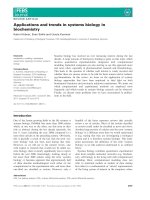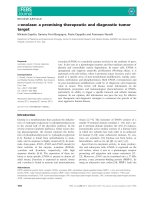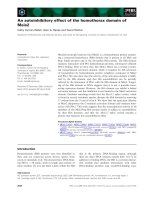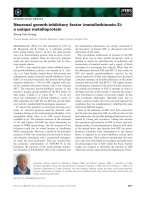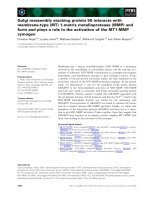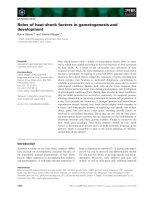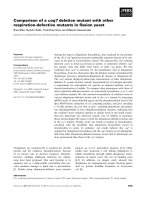Tài liệu Báo cáo khoa học: "Natural Language for Expert Systems: Comparisons with Database Systems" ppt
Bạn đang xem bản rút gọn của tài liệu. Xem và tải ngay bản đầy đủ của tài liệu tại đây (355.92 KB, 4 trang )
Natural Language for Expert Systems:
Comparisons with Database Systems
Kathleen R. McKeown
Department of Computer Science
Columbia University
New York, N.Y. 10027
1
Introduction
Do natural language database systems still
,~lovide a valuable environment for further work on
n~,tural language processing? Are there other
systems which provide the same hard environment
:for testing, but allow us to explore more interesting
natural language questions? In order to answer ,o to
the first question and yes to the second (the position
taken by our panel's chair}, there must be an
interesting language problem which is more naturally
studied in some other system than in the database
system.
We are currently working on natural language
for expert systems at Columbia and thus, expert
systems provide a natural alternative environment to
compare against the database system. The relatively
recent success of expert systems in commercial
environments (e.g. Stolfo and Vesonder 83,
McDermott 81) indicates that they meet the criteria
of a hard test environment. In our work, we are
particularly interested in developing the ability to
generate explanations that are tailored to the user of
the system based on the previous discourse. In order
to do this in an interesting way, we assume that
explanation will be part of natural language dialog
with the system, allowing the user maximum
flexibility in interacting with the system and allowing
the system maximum opportunity to provide different
explanations.
The influence of the discourse situation on the
meaning of an utterance and the choice of response
falls into the category of pragmatics, one of the
areas of natural language research which has only
recently begun to receive much attention. Given
this interesting and relatively new area in natural
language research, my goals for the paper are to
explore whether the expert system or database
system better supports study of the effect of previous
discourse on current responses and in what ways.
1The work described in this paper is partially
supported by ONR grant N00014-82-K-0256.
2 Pragmatics and Databases
There have already been a number of efforts
which investigate pragmatics in the database
environment. These fall into two classes: those that
are based on Gricean principles of conversation and
those that make use of a model of possible user
plans. The first category revolves around the ability
to make use of all that is known in the database
and principles that dictate what kind of inferences
will be drawn from a statement in order to avoid
creating false implicatures in a response. Kaplan
(79) first applied this technique to detect failed
presuppositions in questions when the response would
otherwise be negative and to gener&te responses that
correct the presupposition instead~. Kaplan's work
has only scratched the surface as there have followed
a number of efforts looking at different types of
implicatures, the most recent being Hirschberg's (83)
work on scalar implicature. She identifies a variety
of orderings in the underlying knowledge base and
shows how these can interact with conversational
principles both to allow inferences to be drawn from
a given utterance and to form responses carrying
sufficient ~formation to avoid creating false
implicatures °. Webber (83) has indicated how this
work can be incorporated as part of a database
interface.
The second class of work on pragmatics and
language for information systems was initiated by
Allen and Perrault (80), and Cohen (78) and involves
maintaining a formal model of possible domain plans,
of speech acts as plans, and of plausible inference
rules which together can be used to derive a
2Kaplan's oft-quoted example of this occurs in the
following sequence. If response (B) were generated,
the false implicature that CSEll0 was ~iven in
Spring '77 would be created. (C) corrects this false
presupposition and entails (B) at the same time.
A: How many students failed CSEll0 in Spring '77?
B: None.
C: CSEll0 wasn't given in Spring 77.
3For example, knowledge about set membership
allows the inference that not all the Bennets were
invited to be drawn from response (E) to quesUon
(D):
D: Did you invite the Bennets?
E: 1 invited Elizabeth.
190
speaker's intended meaning from a question. Their
work was done within the context of a railroad
information system, a type of database. As with the
Grieean-based work, their approach is being carried
on by others in the field. An example is the work of
Carberry (83) who is developing a system which will
track a user's plans and uses this information to
resolve pragmatic overshoot. While this work has not
been done within a traditional database system, it
would be possible to incorporate it if the database
were supplemented with a knowledge base of plans.
All of these efforts make use of system
knowledge (whether database contents or possible
plans), the user's question, and a set of rules relating
system knowledge to the question (whether
conversational principles or plausible inference rules)
to meet the user's needs for the current question.
That this work is relatively recent and that there is
promising ongoing work on related topics indicates
that the database continues to provide a good
environment for research issues of this sort.
3 Extended Discourse
What the database work does not address is
the influence of previous discourse on response
generation. That is, given what has been said in
the discourse so far, how does this affect wh~t
should be said in response to the current question "~
Our work addresses these questions in the context of
a student advisor expert 5 system. To handle these
questions, we first note that being able to generate
an explanation (the type of response that is required
in the expert system) that is tailored to a user
requires that the system be capable of generating
different explanations for the same piece of advice.
We have identified 4 dimensions of explanation
which can each be varied in an individual response:
point of view, level of detail, discourse strategy, and
surface choice.
For example, in the student advisor domain,
there are a number of different points of view the
student can adopt of the process of choosing courses
to take. It can be viewed as a state model process
(i.e., "what should be completed at each state in the
process f"), as a semester scheduling process (i.e.,
"how can courses fit into schedule slots?"), as a
process of meeting requirements (i.e., "how do
courses tie in with requirement sequencinge"), or as
process of achieving a balanced workload. Given
4Note that some natural language database
systems do maintain a discourse history, but in most
cases this is used for ellipsis and anaphora resolution
and thus, plays a role in the interpretation of
questions and not in the generation o! responses.
5This system was developed by a seminar class
under the direction of Sa]vatore Stotfo. We are
currently working on expanding the capabilities and
knowledge of this system to bring it closer to a
eneral roblem solvin sstem Matthews 84.
these different points of view, a number of different
explanations of the same piece of advice (i.e., yes)
can be generated in response to the question,
"Should I take both discrete math and data
structures next semesterS":
• State Model: Yes, you usually take them
both first semester sophomore year.
• Semester Scheduling: Yes, they're
offered next semester, but not in the
spring and you need to get them out of
the way as soon as possible.
• Requirements: Yes, data structures is a
requirement for all later Computer Science
courses and discrete math is a co-requisite
for data structures.
• Workload: Yes, they complement each
other and while data structures requires a
lot of programming, discrete does not.
To show that the expert system environment
allows us to study this kind of problem, we first
must consider what the obvious natural language
interface for an expert system should look like.
Here it is necessary to examine the full range of
interaction, including both interpretation and
response generation, in order to determine what kind
of discourse will be possible and how it can influence
any single explanation. A typical expert system does
problem-solving by gathering information relevant to
the problem and making deductions based on that
information. In some cases, that information is
gathered from a system environment, while in others,
the information is gathered interactively from a user
This paper will be limited to backward chaining
systems that gather information interactively as these
provide a more suitable environment for natural
language (in fact, it is unclear how natural language
would be used at all in other systems, except to
provide explanations after the system has produced
its advice).
In a backward chaining system, the expert
system begins by pursuing a goal (for example, to
diagnose the patient as having myoeardia). To
ascertain whether the goal holds or not, the system
gathers information from the user often using
multiple choice questions to do so. Depending on
the answer given to a single question, the system
forms a partial hypothesis and asks other questions
based on that hypothesis.
If natural language were used in place of such
a menu-like interface, the interaction might look
somewhat different. Instead of the system beginning
by asking questions, the user might initiate
interaction by suggesting a plausible goal (for
example, a likely diagnosis) supporting it with several
justifications. The system could use this information
to decide which goal to pursue first and to fill in
information which the system would otherwise have
191
had to request using menu questions. Alternatively,
if the system has several top-level problem solving
capabilities (e.g., perform a diagnosis or recommend
drug treatment), the user's initial question may
indicate which o! these problem solving capabilities is
being called on Again, the system can use this
information to avoid asking a question it would
normally have to ask. The use of natural language
as an "overlay" on an underlying menu system to
allow the user to directly state his/her goals, to skip
irrelelvant questions, and to provide information to a
sequence of menu questions in a single utterance is
an issue we are currently exploring at Columbia.
For example, the underlying expert system in
the student advisor domain has two possible problem
solving capabilities: it can help the student plan next
semester's schedule or it can provide information
about university courses. Using the menu interface,
the system would first query the user to ask which
of these is desired. If the student chose to plan the
next semester schedule, the system next asks a series
of questions to determine the student's year, what
courses have already been taken, and what courses
the student wants to take. A hypothetical natural
language interaction (towards which we are working)
is shown below. Note that the system can avoid
asking three questions in this case (the required
problem solving capability, the student's year, and
the courses already taken) as these are all indicated
in the first user utterance. In the last system
response, the system provides its advice with
jusUfication:
1) User: I'm a sophomore and just finished data
structures. What courses should I take
this spring?
2) System: Have you taken discrete math?
3) User: Yes.
4) System: Are there any courses you'd particularly
like to take?
5) User: I'd like to take less programming
courses.
6) System: I suggest you take fundamental
algorithms and finite math which are
both offered next semester You should
have finished both courses by the end
of your sophomore year and only
fundamental algorithms requires
programming.
There are a number of ways in which this type
of discourse allows us to address our objectives of
taking previous discourse into account to generate
tailored responses. This discourse segment is clearly
concerned with a single purpose which is stated by
the user at the beginnning of the session s This is
the goal that the expert system must pursue and the
ensuing discourse is directed at gathering information
and defining criteria that are pertinent to this goal.
Since the system must ask the user for information
to solve the problem, the user is given the
opportunity to provide additional relevant
information. Even if this information is not strictly
necessary for the problem-solving activity, it provides
information about the user's plans and concerns and
allows the system to select information in its
iustifieation which is aimed at those concerns. Thus,
in the above example, the system can use the
volunteered information that the user is a sophomore
and wants to take less programming courses to tailor
its justification to just those concerns, leaving out
other potentially relevant information.
Is this type of extended discourse, revolving
around an underlying goal, possible in the database
domain? First, note that extended discourse in a
natural language database system would consist of a
sequence of
questions
related to the same underlying
goal. Second, note that the domain of the database
has a strong influence on whether or not the user is
likely to have an underlying goal requiring a related
sequence of questions. In domains such as the
standard suppliers and parts database (Codd 78), it
is hard to imagine what such an underlying goal
might be. In domains such as IBM's TQA town
planning database (Petrick 82), on the other hand, a
user is more likely to ask a series of related
questions.
Even in domains where such goals are feasible,
however, the sequence of questions is only implicitly
related to a given goal. For example, suppose our
system were a student advisor database in place of
an expert system. As in any database system, the
user is allowed to ask questions and will receive
answers. Extended discourse in this environment
would be a sequence of questions which gather the
information the user needs in order to solve his/her
problem. Suppose the user again has the goal of
determining which courses to take next semester.
S/he might ask the following sequence of questions
to gather the information needed to make the
decision:
1. What courses are offered next semester?
2. What are the pre-requisites?
3. Which of those courses are sophomore
level courses?
4. What is the programming load in each
course?
6Over a longer sequence of discourse, more than a
single user ~oa ] is likely to surface. I am concerned
here with
discourse segments
which deal with a
sinle or related set of oals.
192
Although these questions are all aimed at
solving the same problem, the problem is never
clearly stated. The system must do quite a bit of
work in inferring what the user's goal is as well as
the criteria which the user has for how the goal is
to be satisfied. Furthermore, the user has the
responsibility for determining what information is
needed to solve the problem and for producing the
final solution.
In contrast, in the expert system environment,
the underlying expert system has responsibility
coming up with a solution to the given problem and
thus, the natural language system Is aware of
information needed to solve that goal. It can use
that information to take the responsibility for
directing the discourse towards the solution of the
goal (see Matthews 84). Moreover, the goal itself is
made clear in the course of the discourse. Such
discourse is likely to be segmented into discernable
topics revolving around the current problem being
solved. Note that one task for the natural language
system is determining where the discourse is
segmented and this is not necessarily an easy task.
When previous discourse is related to the current
question being asked, it is possible to use it in
shaping the current answer. Thus, the expert system
does provide a better environment m which to
explore issues of user modeling based on previous
discourse.
4 Conclusions
The question of whether natural language
database systems still provide a valuable environment
for natural language research is not a simple one.
As evidenced by the growing body of work on
Gricean implicature and user modelling of plans, the
database environment is still a good one for some
unsolved natural language problems. Nevertheless,
there are interesting natural language problems which
cannot be properly addressed in the database
environment. One of these is the problem of
tailoring responses to a given user based on
previous
discourse
and for this problem, the expert system
provides a more suitable testbed.
References
(Allen and Perrault 80). Allen, J.F. and C.R.
Perrault, "Analyzing intention in utterances,"
Artificial Intelligence 15, 3,
1980.
(Carberry 83). Carberry, S., "Tracking user goals in
an information-seeking environment," in
Proceedings of the National Conference
on
Artificial Intelligence,
Washington D.C., August
1983. pp. 59-63.
(Codd 78). Codd, E. F., et. al., Rendezvous Version
1: An Experimental English-Language Query
Formulation System for Casual Users of
Relational Databases, IBM Research Laboratory,
San Jose, Ca., Technical Report RJ2144(29407),
1978.
(Cohen 78). Cohen, P., On Knowing What to Say:
Planning Speech Acts, Technical Report No.
118, University of Toronto, Toronto, 1978.
(Grice 75). Grice, H P., "Logic and conversation,"
in P. Cole and J. L Morgan (eds)
Syntax and
Semantics: Speech Acts,
Vol. 3, Academic
Press, N.Y., 1975.
(Hirschberg 83). Hirschberg, J., Scalar quantity
implicature: A strategy for processing scalar
utterances. Technical Report MS-CIS-83-10,
Dept. of Computer and Information Science,
University of Pennsylvania, Philadelphia, Pa.,
1983.
(Kaplan 79). Kaplan, S. J., Cooperative responses
from a portable natural language database query
system Ph. D. dissertation, Univ. of
Pennsylvania,Philadelphia, Pa., 1979.
(Matthew 84). Matthews, K. and K. McKeown,
"Taking the initiative in problem solving
discourse," Technical Report, Department of
Computer Science, Columbia University, 1984.
(McDermott 81). McDermott, J., "Rl: The formative
years," A/
Magazine
2:21-9, 1981.
(Petrick 82). Petrick, S., "Theoretical /Technical
Issues in Natural Language Access to
Databases," in
Proceedings of the 20th Annual
Meeting of the Association for Computational
Linguistics,
Toronto, Ontario, 1982 pp. 51-6.
(Stolfo and Vesonder 82). Stolfo, S. and
G. Vesonder, "ACE: An expert system
supporting analysis and management decision
making," Technical Report, Department of
Computer Science, Columbia University, 198~, to
appear in
Bell Systems Technical Journal.
(Webber 83). "Pragmatics and database question
answering," in
Proceedings of the Eighth
International Joint Conference on Artificial
Intelligence,
Karlsruhe, Germany, August 1983,
pp. 1204-5.
193
